Obituaries
Sam Kasten ז׳׳ל passed away on March 4th, 1953 in New York City, just shy of his 84th birthday (April 21st). From obituaries below, we learn that he suffered dementia in his older years and passed away under very difficult and sad circumstances.
He is buried in Har Jehuda cemetery in Upper Darby, PA (outside of Philadelphia) with his wife (pictured below) and sons.
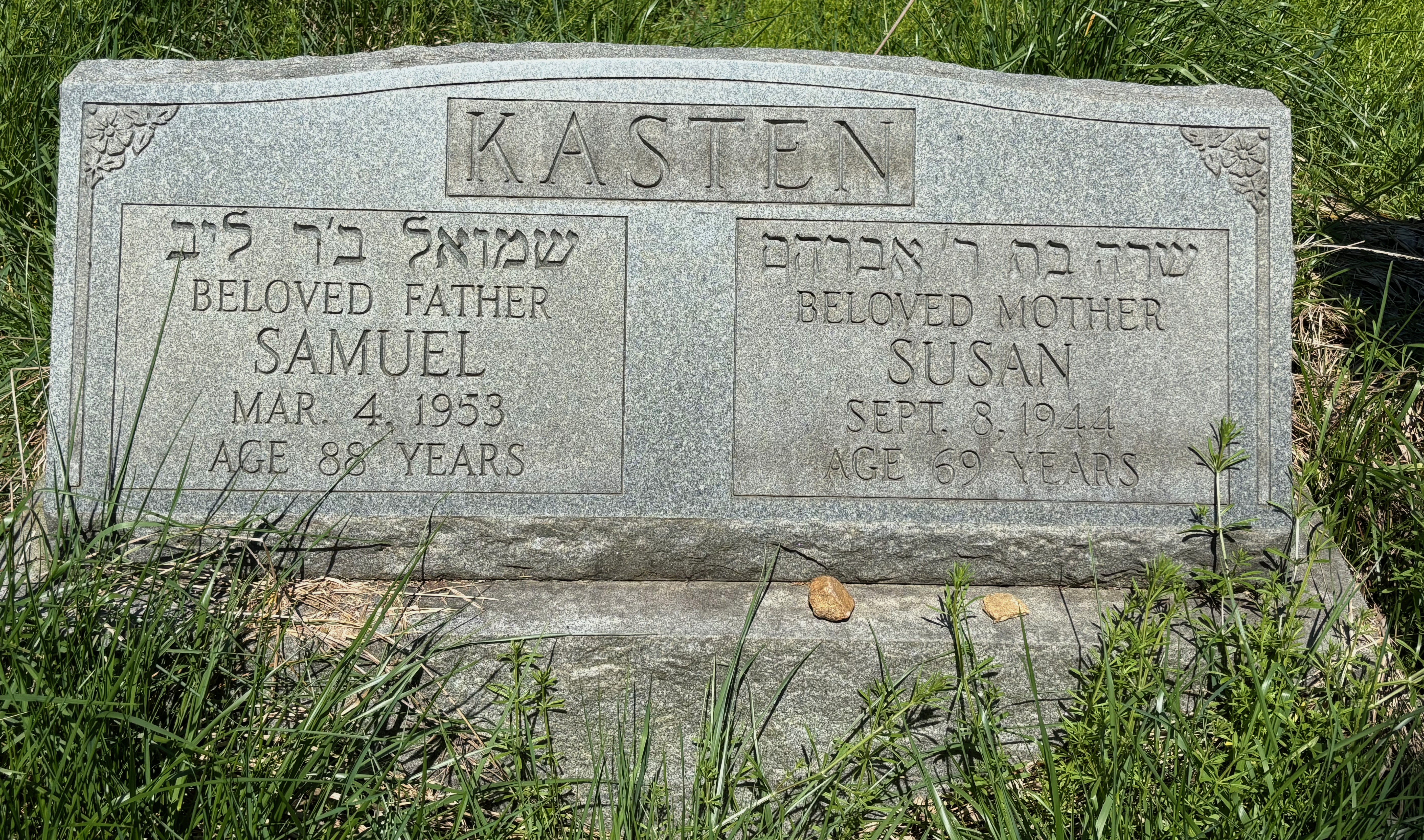
Translations of obituaries and images of the articles themselves are below. I recommend reading them in order to get the full story, as it were.
March 5th, 1953
Published in Der Tog on 1953-03-05
Sam Kasten, famous Yiddish performer, dies; funeral Friday
Following a brief illness, the 88-year old1 famous Yiddish performer Sam Kasten passed away. This evening, his body will be transported to Schwartz’s Funeral Parlor at 2nd and 10th.
The funeral will take place tomorrow, Friday, at 12 pm in Philadelphia at Rosenberg’s Funeral Parlor, 2009 N Broad St.
A representative from the Hebrew Actor’s Union, where the deceased was beloved and esteemed, will take part in the funeral2.
Sam Kasten ע׳׳ה3 was one of the most highly sought-after comedians in Yiddish operettas, and he was beloved by Jewish audiences across America and Europe4.
The last three years of his life, Sam Kasten didn’t perform any longer. Before then, he would appear before audiences once a year or so for a special “honor-event”5 that his fans and friends would arrange for him. Prominent Yiddish actors would appear in these performances too. Old and aged but full of life as ever, Sam Kasten would also show up at the Actor’s Union meetings, as well as at the Yiddish Actor’s Club.
Sam Kasten ע׳׳ה’s death has brought a great sadness to the theater community.
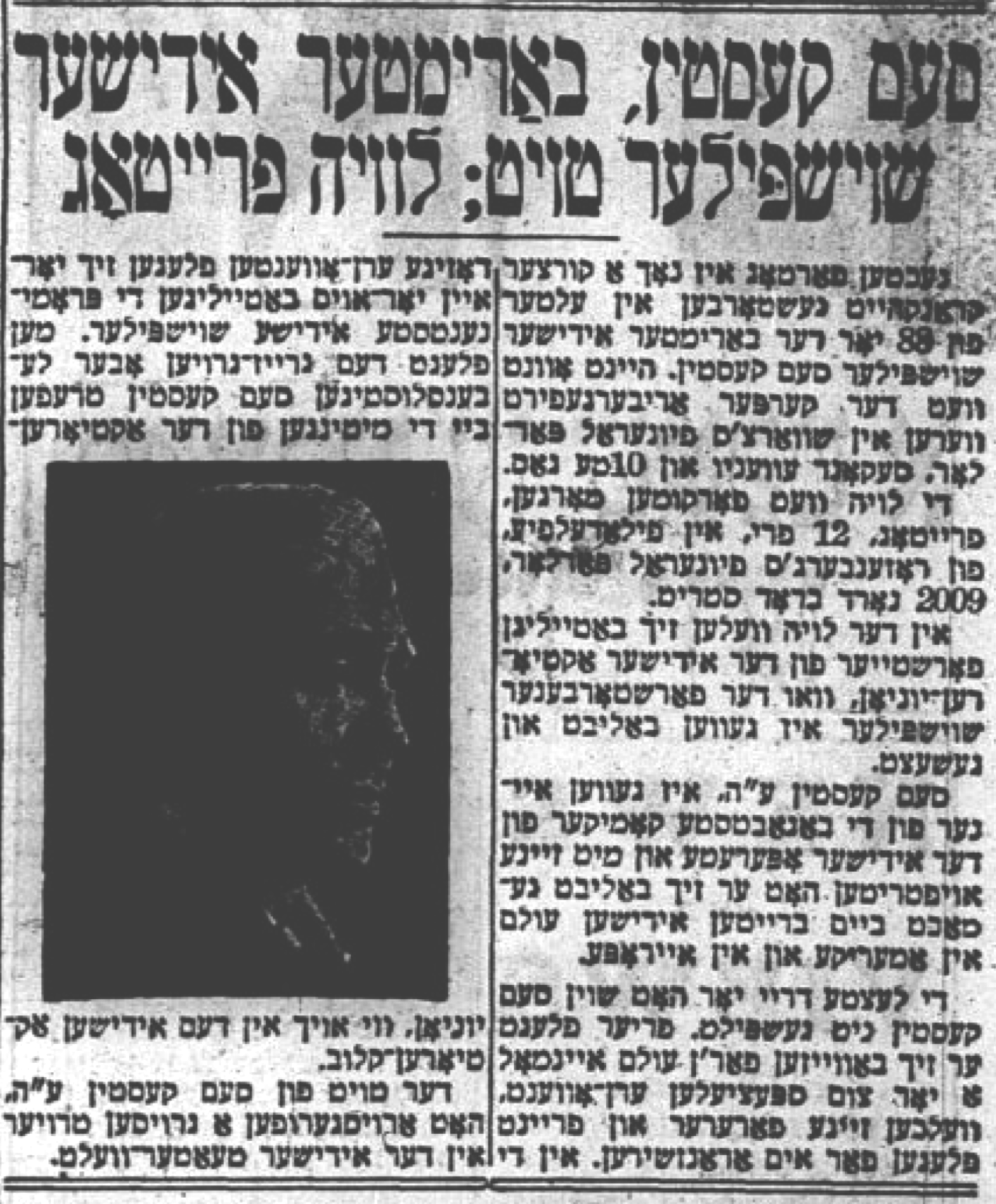
March 6th, 1953
Published in the Forverts on 1953-03-06
The happy and tragic Sam Kasten
He outlived his generation, his time, and indeed himself. – A modest flower on his fresh grave.
The last few years of his life, Sam Kasten didn’t perform any theater. The last time he appeared on the stage was three years ago at one of the special events honoring him that a few of his close friends used to arrange, sometimes in Second Avenue Theater, sometimes in Public Theater. Hundreds and thousands of his longtime fans used to come see him perform, shaking their heads in wonderment - look how he still dances! Look how youthful he is! And it did them a world of good to see, because if he, the old man Kasten who they remember from back in the old days, can move his feet like that and even do somersaults, then they too would be “alright.” They could stay young just like him.
When they were still young scamps themselves, they saw him perform in Horowitz’s Der Poylisher Yingl and in Shaknovitch’s Immigranten6. Kasten performed in Mogulesko’s roles, immitating his older famous colleague but still with a Kasten-ishness in his acting. And he was the very best dancer, so light on his feet…
But for the last few years of his life, Kasten wasn’t who he used to be. He was always joyful, always had a few jokes ready to go with a smile. But on the inside, when he was by himself, he was deeply uphappy. He had lost two fo this three children - his only daughter Lily7 and his older son Fred8. He had lost his wife Suzie nine years ago9. Like a true actor, he hid his true feelings from the world. But depressed he was.
Lola10, painter and Forverts cartoonist, grew very close to Kasten and took him under his wing in the last few years. And Kasten, who was a couple decades older than Lola, called him zayde and really clung to the much-younger Lola. More than once when Kasten wouldn make one-too-many “l’chaim”11, Lola would tenderly wrap him up in his coat and take him back to his hotel.
He had lost his wife and two of his children. He also outlived the Yiddish theater, and indeed himself. And he was depressed, miserable - an ibergeblibener12.
According to his son Lewis Kasten, he was more like a child than adult during the last two years of his life13. Nevertheless, from time to time he would regain his memory, and he’d slip out of the house and make for the Yiddish Actor’s Club. They’d have to escort him back home.
One time in the last few months, when he came to the Actor’s Union, he ran into the writer Sholem Perlmutter, took his hand, looked him in the eye and said:
“When - when it comes time for my funeral, come to Philadelphia and a few words about me.”
And the words one could say about him are:
A piece of Yiddish theater is gone along with him. He was among the first there was, from the very start. He began acting in Singer’s Hall in Brooklyn some 60 years ago. After that, he played real theater in Philadelphia in Franklin Theater. And from then on, he spent six decades performing in every city and state across America where Jews live.
He was more of a “buf”14 comedian than a character actor. He was easy, mischevious, and superficial, if you will, but with such charm. He was theater itself, through and through, with all the good and bad parts of the profession. His colleagues remember him as a good friend and partner, a harziger mensch.
Three weeks ago on a Sunday morning, during the blizzard in New York - the only snow storm we had this winter - Sam Kasten snuck out of his hotel. He didn’t know why he went out or where he was going. A few hours later, he was found half frozen to death on the bank of the East River. Not knowing who this ragged little old man with the head of white hair was, the police brought him to City Hospital on Welfare Island. They later determined who he was and informed his son Lewis, but Sam Kasten was too weak and his temperature was too high to be taken home.
So, he spent the last three weeks of his life on Welfare Island. None of his longtime friends or admirers knew where he was. Only his son and Charlie Cohan, the secretary of the Theatrical Alliance, came to him during the last days of his sad life. On Wednesday morning, his soul departed his body.
In the old days, when the likes of Mogulesko, David Kessler, or Jacob P. Adler passed away, grand funerals would be held. Fans would come in the thousands to bid them farewell. I want to believe that, in Philadelphia, scenes like this will also accompany Sam Kasten as he goes to his eternal rest. He wanted to be buried with his wife and children, and his wish was of course granted. Like every actor, he hoped for a grand funeral.
But I am afraid that the days of grand funeral processions are gone. Just another funeral for an actor who hasn’t performed in years, who outlived his generation and his time….
As one of Sam Kasten’s many friends - how often we would meet to kibitz in the theater-kibitzarnie, Lola, myself, and Lola’s “grandson”15 - I carry a modest flower to the joyous-tragic Sam Kasten.
Rest in peace, old friend.
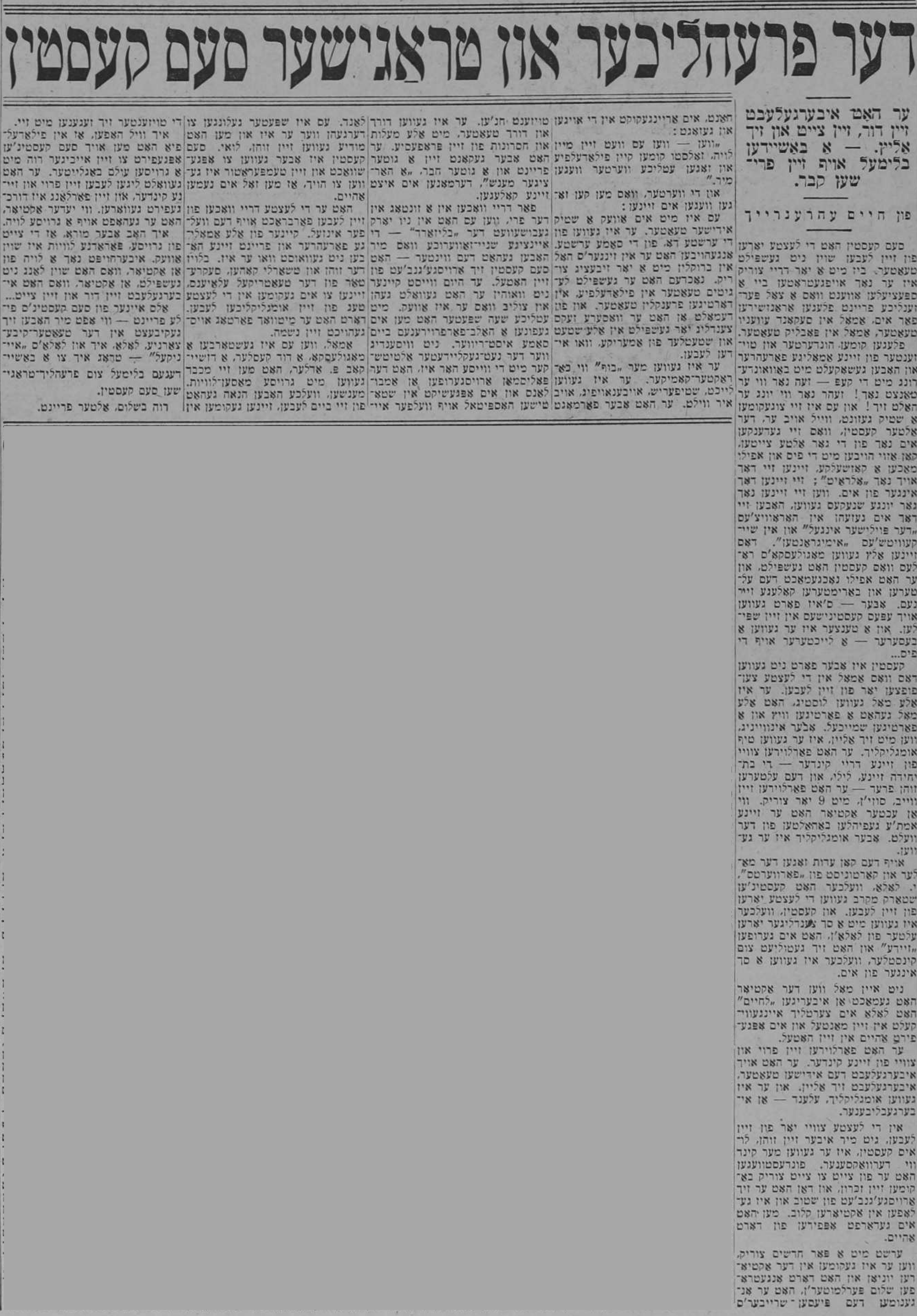
March 17th, 1953
Published in Der Tog on 1953-03-17
Sam Kasten
A word on his fresh grave.
Sam Kasten lived his life quietly, withdrawn and in a very hospitable manner16. The Yiddish theater world remembers Sam Kasten from his prolific days when he created personalities and characters on the Yiddish stage. Many of them also know that with the death of Sam Kasten, the Yiddish theater world has lost a talented performer. He was one of the first. Sam Kasten was almost one of the pioneers who began in the kheder of Abraham Goldfaden. And throughout his entire career as a Yiddish actor, he was a mirror into those times.
Many remember when he was the the “buf”17 who sang couplets and danced. Many others also remember when he excelled in roles that Sigmond Mogulesko played like “dos poylisher yingl”18 from Professor Ish Horowitz Halevy; “Feitl Pavolye” in Nahum Meir Shaknovitch’s (Shomer’s) Immigranten. And the whole world remembers when he performed with David Kessler, Jacob P. Adler, and other notables like Shildkraut. He really excelled in character-comedy roles.
But just as life doesn’t stay still forever, neither do the performing arts, but it instead evolves over time. The new young generation always arrives on the scene, bringing their own concepts and ideals to the stage. And in the end, these young performers emerge victorious because the old guard must give way to new, just as in life.
Sam Kasten was, in this case, an exception. He has always caught our eye and drawn our attention because he absorbed the theater atmosphere along with his mother’s milk. His later activities on the Yiddish stage helped him a lot to become a famous actor, comedian, and mensch and made him immensely popular on the stage.
Sam Kasten was the first to bring ordinary comedy to the Yiddish stage. His possesses a terrific enthusiasm, a lot of impetuousness, a booming presence and tempestuousness. Theater audiences always looked upon him with wonderment. When Sam Kasten danced such that the stage floorboards shook under his feet, he became energized and ignited with spirit, and his talent spilled out from him as he danced with a fiery passion in his eyes. He sang, danced, and burned with them. The great joy he derived from performing theater shook him up and gradually transformed into theatrical passion. He never grew tired and or apathetic, but always possessed an actor’s ectasy. Both audiences and critics alike always held his talent in high esteem.
Kasten’s laughter was never contrived. Just like Mogulesko’s, his comedic style was always entirely original, fresh, pure, and sincere. Just as his whole essence always gushed with passion and youth, so too did his talent.
His sole consolation in life over the last few years was his only surviving son Louie19. When he spoke of Louie, tears would well up in his eyes. Many times, he used to say to his closest friends, “What would I do without my Louie?” Louie was more than just a son to Sam, but a companion, a friend. Louie had always called him “Sam.” He was the only happiness20 in Sam’s life.
Eight or maybe ten weeks ago, Sam Kasten met the author of this very article, with whom he was a very dear friend, and no sooner than he saw him he called out:
“Sholem, when I die and they bury me in Philadelphia, I want you to promise me that you will come to my funeral and say a few words about me.”
When the Hebrew Actor’s Union chose me to go to Sam Kasten’s funeral in Philadelphia as the organization’s representative, I accepted this honor with great respect and went to the funeral.
But, later, I returned home disappointed with a heavy weight on my heart. Louie Kasten, Sam Kasten’s son, told me that there will be no Yiddish “speeches.” And when I explained to him that I came in the name of the Hebrew Actor’s Union and also according to his own father’s wishes, he answered me: “I am very sorry”21. And thus, not a single Yiddish word was spoken at Sam Kasten’s funeral. In protest, I left the hall and did not go to the cemetery.
And to the audiences who protested that the Hebrew Actor’s Union didn’t take part in Sam Kasten’s funeral, the author of this article explains to them why exactly that was the case…
Sam Kasten served the Yiddish stage for nearly his entire life. He began his career in the old “Singer’s Hall” in Brownsville on Watkins St. The music hall was called “Scheider’s Singer Hall” because the manager was named Schneider. Other actors performed in various plays there too, like Jacob Frank, Max Gabel, Samuel Scheider, and Jacob Wexler. The star among them was Aaron Morgenbesser, and Sam Kasten, who played the “buf”22 comedian roles, made the audiences laugh. But off stage, Sam Kasten could also be very serious. Very often, he would give a stern and sharp word when people needed to hear it. But those very words were never said from a place of anger, but from a place of seriousness.
Everyone who knew him got a lot of joy being in his company, because everyone knew and felt that Sam Kasten was a harziger mensch, a good companion, and a true friend.
ת׳נ׳צ׳ב׳ה!23
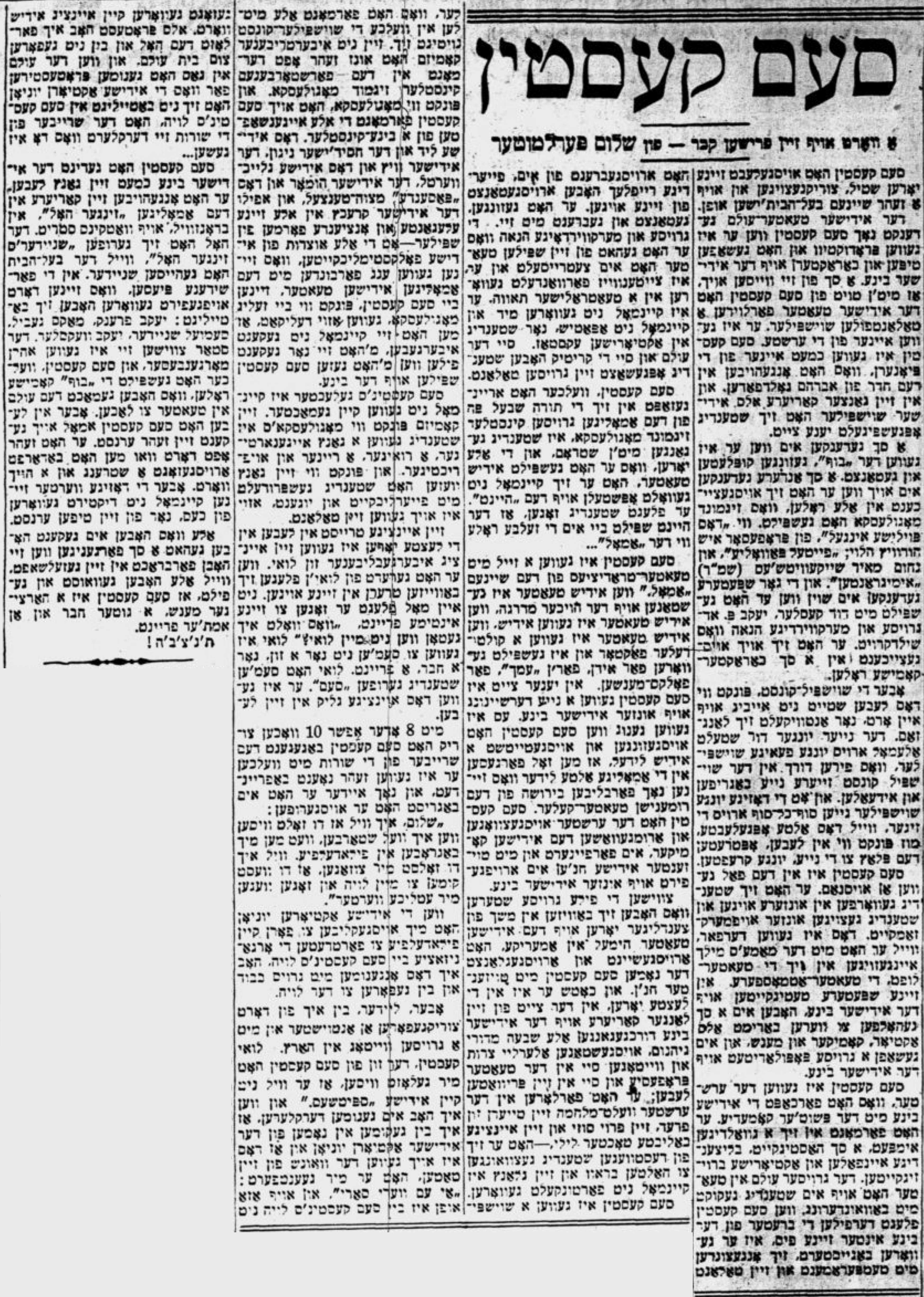
April 4th, 1953
Published in Der Tog on 1953-04-04
My dear old friend24
By Boaz Young25
For Sam Kasten’s shloshim
When you’re sitting by yourself in a room in Los Angeles, and you look out at the beautiful, sunny weather, all kinds of thoughts come to mind. You think more about the past as eternity draws nearer… Suddenly you hear footsteps… They’re the footsteps of the messenger who brings news - good news, bad news, to the people in the building.
I run to meet him. He hands me a letter. Holding the letter in my hand, I feel that it barely weighs anything. I say to my myself: my friend, the actor Mordechai Yachson, nebekh, is so stingy he won’t use more than a shtikel paper. I open and take out a single piece of printed paper just three inches long, on which is a picture of my dear old friend, Sam Kasten.
I stay standing… and look at the picture and think: Is this shred of paper all I have left to remember him by, when such a thing should fill hundreds of sheets of paper… Memories of a 65-year-long friendship from my life in the theater. A life of hunger, wandering, licentiousness but also honor, fortune, and fame.
In my subconscious, events and episodes we experienced over the last 65 years of our life in the theater begin to swim around. And I think further: Is this bit of paper now the open grave where I bury the all the comical-tragic times we went both through together on the stage of our lives? We both married actresses who were friends like we were. And both of them gave us a daughter, who both (our children) died of the same illness (cancer). Almost at the same time, the witch, the old man, and Father Time with sickle in hand, cut short the lives of our own children.
And now he has come for you at 85 years (I saw his naturalization papers26), and soon will come for me.
Sam Kasten absorbed the great Sigmond Mogulesko’s essence itself and passed it along to the audiences in his own charming way. People used to call him the “Yiddish George Cohan.” Kasten was recognized as a first-class “buf-comedian”27. That’s why I rewrote the melodrama Di Bigamist’n28 by the late actor Meisel into a musical called Mayn Vayb’s Man29 - or as they called it in Europe, Semkele, and created leading roles for both him and my wife Clara Young. I remember how he covered me with kisses when he came off from the stage after the duet he and Clara sang together in Mayn Vayb’s Man as the audience loudly applauded.
And I remember, in Baltimore, when the great tragedy happened in our theater and 34 people died30. Kasten didn’t perform in the play that evening. He was standing by the door manning the box office. He collected $150. The play hadn’t started yet, and the cash register was full of money. The next day, Kasten brought us back the money. We wanted to split up the $150 among us, but Sam Kasten said to us,
“Colleagues, there are 34 funerals across the city today. At the box office, I sold a ticket to an aquaintance of mine and his wife. While trying to save her, he was trampled to death. His wife is now a widow with children without a provider. We didn’t even perform the play - should we now divide up their dollars among us? I think,” the young Kasten31 continued, “that we should give the $150 to the wives whose husbands and children were killed so horrifyingly in our theater. We should do something for them…”
And then Kasten gave the money to the committee which was arranged to support the wives of the deceased.
May this memory be a flower on your grave.
My departed colleague, my dear old friend Sam Kasten, together we were the last two Mohicans of the Yiddish theater… We arrived to the theater when he32 was just starting to stand on its own. We helped him walk, helped him pull the heavy wagon… Now, he’s left not knowing what to do or where to go at all… with you gone… And I am left alone, the last Mohican…
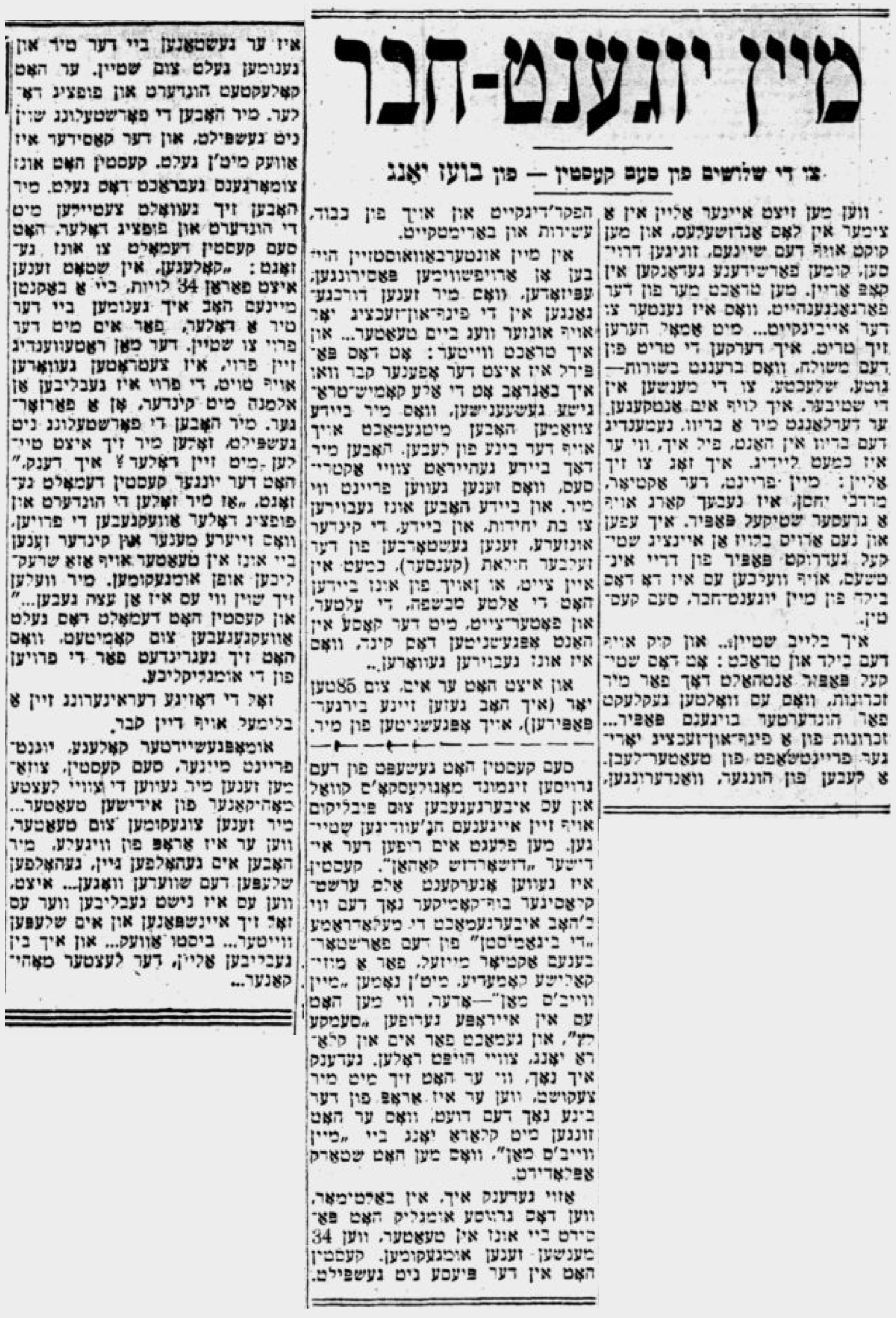
Footnotes
Again, he was actually 83. It’s not clear where 88 came from.↩︎
The representative was Sholem Perlmutter. The article he wrote about his experience is translated below.↩︎
עליו–השלום; may peace be upon him↩︎
Note that we don’t actually have any specific knowledge that he ever traveled to Europe; he either did tour Europe but we do not have a record, or this is just embellishment.↩︎
Performances specifially held to honor/benefit an actor; ערן–אָווענט↩︎
These plays, The Polish Boy and Immigrants, were popular in the 1890s/1900s.↩︎
She died of ovarian cancer in 1946 at the age of 48.↩︎
He died of longterm lung complications from mustard gas exposure World War I in 1935 at the age of 39.↩︎
She did in 1944.↩︎
לאָלאַ; The pen name of Leon Israel↩︎
a toast, and of course a drink!↩︎
One who remains; somewhat evokes post-Holocaust Yiddish phrasing for the wretched survivors↩︎
In other words, he had dementia.↩︎
slapstick comedy↩︎
referring to Sam, who called Lola “zayde”↩︎
Possible mistranslation here? from אויף א זעהר שיינעם בעל–הבית–ישען אפון↩︎
slapstick comedian↩︎
the Polish boy↩︎
Lewis Kasten, 1902 - 1975↩︎
The article uses גליק.↩︎
Answered in English.↩︎
slapstick↩︎
A hebrew acronym commonly used as epitaph and means “May his soul be bound in the bundle of life.”↩︎
He specifically uses a phrase meaning, “friend since youth.”↩︎
An actor and dear friend of Sam’s. They had performed together since the 1890s.↩︎
Boaz here is implying that he alone truly knows how old Sam is. The mystery lives on!↩︎
slapstick↩︎
The Bigamist↩︎
My Wife’s Husband↩︎
Read Sam’s account of this incident in his memoirs where someone yelled fire in a theater because they mistook a flame from a gas pipe, and (more likely) 23 people were trampled in a stampede to escape.↩︎
He would have been about 26.↩︎
the theater, metaphorically↩︎